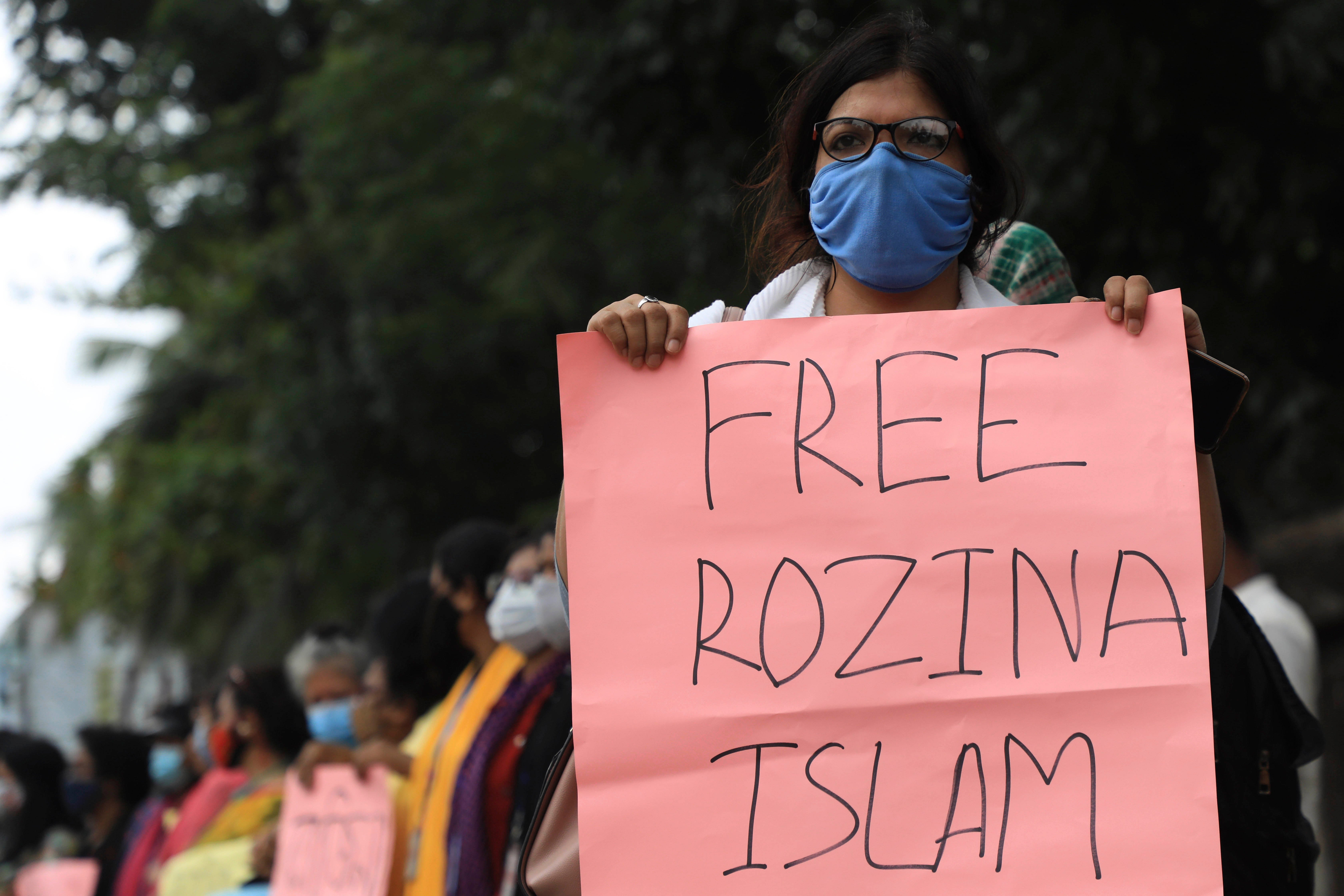Bangladesh: Arrest of Journalist Investigating Corruption
(New York) – Bangladesh authorities should drop all oppressive charges against the renowned Bangladeshi journalist Rozina Islam, Human Rights Watch said today.

Islam’s colleagues believe she was detained over her reporting on corruption and mismanagement in the public health sector, including the government’s response to the Covid-19 pandemic. Islam is accused under sections 3 and 5 of the Official Secrets Act and sections 379 and 411 of the Penal Code, for allegedly attempting to “collect sensitive government documents and taking photos of them” at the Health Ministry. If convicted, she faces up to 14 years in prison and the possibility of the death penalty. Journalists across Bangladesh are protesting to seek her release. “Bangladesh authorities should produce evidence of wrongdoing or immediately release Rozina Islam and stop arresting journalists for doing their job, which is also to highlight governance flaws,” said Brad Adams, Asia director. “Instead of locking up critics, encouraging a free press should be central to the government’s strategy to strengthen health services in combatting the pandemic.” Media reported that Islam went to the Health Ministry at around 3:30 p.m. on May 17, 2021, for a meeting with the health services secretary. She was confined to a room there for nearly six hours, during which she fell ill and fainted, then was taken to the police. According to the complaint filed by the Health Ministry, she had taken government documents related to the procurement of Covid-19 vaccines. She denies these allegations. In a video recording by another journalist after her hearing on May 18, Islam said that, “because of my reporting on the Health Ministry, I am being wronged.” Her recent work includes reporting on bribery in recruitment at the health directorate, irregularities in the purchasing of emergency medical supplies to respond to the Covid-19 pandemic, and for holding much-needed donated emergency medical supplies at the airport for ten months. On May 18, a magistrate court turned down the police department’s request for 5-day remand and instead sent her to jail until her bail hearing on May 20.
The court ordered the police to submit a report on their investigation into the allegations by July 15 and for the jail authorities to ensure that Islam has access to necessary medical care according to national law. The Bangladesh Editor’s Council said that Islam’s arrest under a colonial-era law is “the manifestation of the negative attitude and the evil mentality of the authorities concerned to gag newspapers.” The Committee to Protect Journalists called for her release, while a spokesperson for the UN secretary-general expressed concern. Bangladesh authorities have frequently gone after journalists and the media for reporting critically on the government’s response to the pandemic. For instance, in May 2020, the authorities arrested four people and charged seven others for “spreading rumors and misinformation on Facebook” because they criticized the government’s response to the pandemic. Mushtaq Ahmed, a writer who was among the four, died in custody on February 25 after being held in pre-trial detention for nine months during which it has been credibly alleged that he was tortured. After a public outcry over Ahmed’s death, Ahmed Kabir Kishore, a cartoonist arrested at the same time, was granted bail. He described being tortured after he was taken into custody and also said that Ahmed had been brutally beaten. The authorities have also increased surveillance of anyone who might spread “rumors” about the Covid-19 pandemic and ramped up media censorship. Human Rights Watch and eight other organizations wrote to Michelle Bachelet, the UN High Commissioner for Human Rights, on World Press Freedom Day, on May 3, raising concerns over continuing attacks on the media including arbitrary arrests, torture, and extrajudicial killings. “The arrest of Rozina Islam sends a terrifying message to journalists uncovering corruption in Bangladesh,” Adams said. “By speaking out for Islam, concerned governments will be standing with Bangladeshi journalists across the country.”.
Read the full article at the original website
References:
- https://www.hrw.org/asia/bangladesh
- https://www.aljazeera.com/news/2021/5/18/rozina-islam-bangladesh-arrests-journalist-for-covid-reporting
- https://en.prothomalo.com/bangladesh/rozina-islam-was-victim-of-vengeance-for-reporting-on-corruption
- http://bdcode.gov.bd/upload/bdcodeact/2019-11-03-10-19-31-138_The_Official_Secrets_Act_1923.pdf
- http://bdlaws.minlaw.gov.bd/act-75.html
- https://www.dhakatribune.com/bangladesh/nation/2021/05/18/journalists-across-districts-demand-rozina-s-release
- https://www.hrw.org/about/people/brad-adams
- https://www.thedailystar.net/bangladesh/news/journalist-rozina-islam-sued-under-official-secrets-act-2094245
- https://www.prothomalo.com/bangladesh/%E0%A6%B0%E0%A7%8B%E0%A6%9C%E0%A6%BF%E0%A6%A8%E0%A6%BE%E0%A6%95%E0%A7%87-%E0%A6%A8%E0%A6%BF%E0%A7%9F%E0%A7%87-%E0%A6%B6%E0%A6%BE%E0%A6%B9%E0%A6%AC%E0%A6%BE%E0%A6%97-%E0%A6%A5%E0%A6%BE%E0%A6%A8%E0%A6%BE%E0%A7%9F-%E0%A6%B0%E0%A6%BE%E0%A6%A4%E0%A6%AD%E0%A6%B0-%E0%A6%A8%E0%A6%BE%E0%A6%9F%E0%A6%95%E0%A7%80%E0%A7%9F%E0%A6%A4%E0%A6%BE
- https://www.dhakatribune.com/bangladesh/dhaka/2021/05/17/prothom-alo-journo-handed-over-to-police-by-health-ministry
- https://www.prothomalo.com/bangladesh/%E0%A6%8F%E0%A6%96%E0%A6%A8-%E0%A6%8F%E0%A6%95-%E0%A6%95%E0%A7%8B%E0%A6%9F%E0%A6%BF-%E0%A6%A6%E0%A7%87%E0%A6%AC%E0%A6%AA%E0%A6%B0%E0%A7%87-%E0%A6%86%E0%A6%B0%E0%A6%93-%E0%A6%AA%E0%A6%BE%E0%A6%AC%E0%A7%87%E0%A6%A8?fbclid=IwAR2nOruLFpISn1e9mWTSXRzfwXmjRQAz1q664q2XH6IzeKWAtA6VuQBK08o
- https://www.prothomalo.com/bangladesh/%E0%A7%A9%E0%A7%AB%E0%A7%A6-%E0%A6%95%E0%A7%8B%E0%A6%9F%E0%A6%BF-%E0%A6%9F%E0%A6%BE%E0%A6%95%E0%A6%BE%E0%A6%B0-%E0%A6%9C%E0%A6%B0%E0%A7%81%E0%A6%B0%E0%A6%BF-%E0%A6%95%E0%A7%87%E0%A6%A8%E0%A6%BE%E0%A6%95%E0%A6%BE%E0%A6%9F%E0%A6%BE%E0%A7%9F-%E0%A6%85%E0%A6%A8%E0%A6%BF%E0%A7%9F%E0%A6%AE-2
- https://www.prothomalo.com/bangladesh/coronavirus/%E0%A6%AA%E0%A7%9C%E0%A7%87-%E0%A6%86%E0%A6%9B%E0%A7%87-%E0%A6%9C%E0%A7%80%E0%A6%AC%E0%A6%A8-%E0%A6%B0%E0%A6%95%E0%A7%8D%E0%A6%B7%E0%A6%BE%E0%A6%95%E0%A6%BE%E0%A6%B0%E0%A7%80-%E0%A6%B8%E0%A6%BE%E0%A6%AE%E0%A6%97%E0%A7%8D%E0%A6%B0%E0%A7%80
- https://www.dhakatribune.com/bangladesh/court/2021/05/18/court-wants-probe-report-in-case-against-journalist-rozina-islam-on-july-15
- https://www.dhakatribune.com/bangladesh/2021/05/18/editors-council-rozina-islam-s-arrest-a-black-chapter-in-history-of-bangladesh-journalism
- https://cpj.org/2021/05/bangladeshi-authorities-arrest-journalist-rozina-islam-under-official-secrets-act/
- https://www.un.org/press/en/2021/db210518.doc.htm
- https://www.hrw.org/news/2020/03/31/bangladesh-end-wave-covid-19-rumor-arrests
- https://www.hrw.org/news/2020/05/07/bangladesh-mass-arrests-over-cartoons-posts
- https://amp.france24.com/en/20200506-bangladesh-police-charge-11-for-spreading-virus-rumours
- https://www.hrw.org/news/2021/02/26/bangladesh-writer-dies-after-9-months-custody
- https://www.thedailystar.net/frontpage/news/scars-torture-all-over-him-2055265
- https://www.thedailystar.net/frontpage/news/monitoring-media-info-ministry-scraps-circular-amid-outrage-1886434
- https://www.newagebd.net/article/104128/new-bangladesh-directives-drop-mass-media-from-emergency-service-list
- https://www.hrw.org/news/2021/05/03/un-stand-bangladeshi-journalists-press-freedom-day
